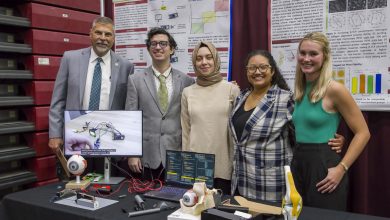Melbourne High Graduate, Doctoral Candidate Earns NSF Fellowship in Japan for Reptile Research
MELBOURNE, FLA.—Bill McLamb, a doctoral candidate in cell and molecular biology at Florida Institute of Technology and 1982 graduate of Melbourne High School, earned a National Science Foundation research fellowship in Japan for summer 2011. He was principal investigator in an East Asia and Pacific Summer Institutes (EAPSI) project; EAPSI is sponsored by the National Science Foundation and the Japan Society for the Promotion of Science.
McLamb’s doctoral research focuses on the molecular mechanisms of thermosensation and infrared detection in snakes, which he conducts under adviser Michael Grace, associate dean and associate professor in the College of Science.
In the host laboratory of Dr. Makoto Tominaga, Division of Cell Signaling at the Okazaki Institute for Integrative Bioscience, National Institute for Physiological Sciences, in Okazaki, Japan, McLamb worked closely with Shigeru Saito. The two conducted experiments that led to the successful cloning and sequencing of a thermosensitive protein in the green anole, a well-characterized model organism for the study of reptiles. Anoles are common in Florida.
The research also led to the identification of a novel protein in snakes, which may play a part in snake thermosensation “This project will increase our understanding of complex reptilian sensory behavior, including prey detection, predator avoidance and thermoregulatory site selection. It will also provide insight into the evolution and functional utility of thermosensitive proteins in novel sensory systems,” said McLamb.
“Additionally, this work will support research on how environmental change affects predatory success. It will contribute to the goals for continued management and conservation of the ecological resources that support these reptilian predators,” he added.
“Our work is providing new insight into the threat of invasive Burmese pythons and other snakes that effectively “see” heat—day or night—with their infrared-imaging pit organs,” said Grace. “As we learn more about the snake infrared imaging system, the single best thermosensor on Earth, our work may pave the way for development of a new generation of artificial heat sensors for a variety of applications.”
The EAPSI goals are to introduce U.S. graduate students to East Asia and Pacific science and engineering research and to help students initiate scientific relationships to better enable future collaboration with foreign counterparts.
McLamb received his bachelor’s degree in biological sciences in 1986 and his master’s degree in cell and molecular biology in 1989—both from Florida Tech. Previously employed as a research scientist at Kennedy Space Center, he returned to Florida Tech in 2006 to begin a doctoral degree and conduct funded research.




